MARYLAND FILM FESTIVAL 2001: MORE DOC
FILMMAKERS
(5/14/2001)
by Kent Bye
The combination of "Baltimore" and "Film"
usually stirs up thoughts of either John Waters,
Barry Levinson, or the cancelled television series
"Homocide: Life on the Street." The Maryland Film
Festival is looking to add itself to this list by
continuing to grow in scale and popularity in its
third year. Fundraising is a strong point for this
young fest which enables it to provide all-expense
paid trips to Baltimore for all of the feature
filmmakers, extensive advertising and coverage in
the local press, and healthy audiences of
enthusiastic cinephiles. Film Threat's Kent Bye
was on the scene at The Maryland Film Festival to
catch all of the highlights including a screening
of one of Waters' favorite films, "The Godfather
of Gore" Herschell Gordon Lewis, and a ton of
filmmakers who have been creating some buzz on the
festival circuit. Now we’re going to make it easy
for you, just click on a link below to take you to
the next set of pictures in our Maryland Film
Festival Photo Diary 2001!
MARYLAND
FILM FESTIVAL 2001 PHOTO DIARY
MARYLAND
FILM FESTIVAL 2001: GORE MOVIES GALORE
MARYLAND
FILM FESTIVAL 2001: DOC FILMMAKERS
MARYLAND
FILM FESTIVAL 2001: MORE DOC FILMMAKERS
MARYLAND
FILM FESTIVAL 2001: FEATURE FILMMAKERS
MARYLAND
FILM FESTIVAL 2001: MORE FEATURE AND SHORT
FILMMAKERS
|
|
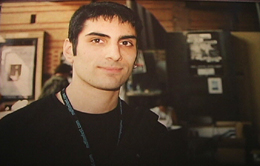 |
| Joshua Tunick
originally was going to do a documentary on a
living room tour by Pat DiNizio, the lead singer
of The Smithereens, but then he found out that
he was planning on running for Senate. "Mr.
Smithereen Goes to Washington" documents
DiNizio's unsuccessful run as a Reform Party
candidate in New Jersey. It world premiered at
the festival. |
 |
| Pat DiNizio
was on hand to play some tunes and support the
doc "Mr. Smithereen Goes to Washington." DiNizio
spent around $50,000 in his campaign effort
while his democratic opponent Jon Corzine spent
more than $60 million to win the
election. |
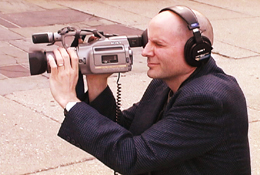 |
| Lee Boot's
"Making Euphoria" blends philosophy, neurology,
performance art, and deadpan humor to describe
what our brain needs to make us happy. Boot
received a Small Business Innovation Research
grant from the National Institute of Health to
help fund his pilot that he is currently
shopping around to different television
networks. |
 |
| Editor Paul
Seydor and new Baltimore Sun critic Michael
Sragow were on hand to present "Cobb." Sragow
selected Ron Shelton's 1994 biopic on baseball
legend Ty Cobb because audiences largely ignored
it when it was first released. Seydor edited the
film and showed outtakes and explained why he
cut them. He also screened his '97
Oscar-nominated short doc "The Wild Bunch: An
Album in Montage" where he used found footage to
give insight into the production of Sam
Peckinpah's classic
western. |
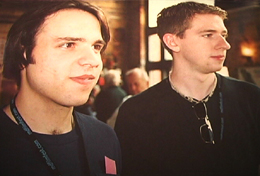 |
| Cinematographer Brian Nisbett and
director Ryan Butler produced "A Union in Wait,"
which is the first documentary concerning the
debate over same-sex
marriage. |
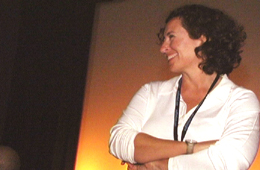 |
| Kim Snyder
explores her mysterious medical condition of
Chronic Fatigue Syndrome in "I Remember Me." Not
only does this affliction have no cure, but it
also has no clear definition of what exactly it
is. |
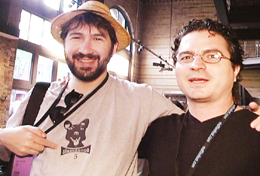 |
| Slamdance
co-founder Dan Mirvish presented a couple of
shorts programs from Slamdance, and Alex Nohe
screened his debut feature-length doc entitled
"Burning Man: The Burning Sensations" about
Nevada's annual Burning Man
Festival. |
 |
Veteran music
documentarian Robert Mugge screened two films at
this year's festival. His 1980 doc "Sun Ra: A
Joyful Noise" chronicles a composer and
philosophical guru who claimed to be from
Saturn, and "Rhythm 'n' Bayous" investigates the
different musical styles and sounds of the
north, southeast, and southwest regions of
Louisiana.
Read the next installment
in Film Threat's photo diary MARYLAND
FILM FESTIVAL 2001: FEATURE
FILMMAKERS>>>
| |



